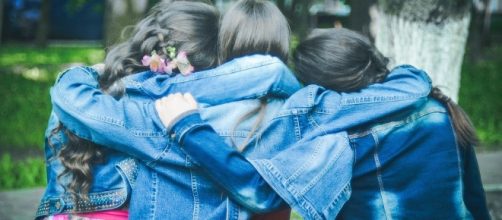Having your very own group in High School was totally a big deal. In those teenage years, most students felt like they had to be a part of a certain clique to feel that they belonged.
For youngsters, it's like their identity.
Teenagers through the years have always considered these little groups to be almost like a safe haven. This is where they share their interests, activities and most of the time, their problems. We see these groups in movies all the time. The perfect example would be "High School Musical." You see the jocks, cheerleaders, skateboarders and even the "emo" kids all grouped separately.
The thing is, they don't readily let other people join in. Now, what happens to the rest?
Back in high school, were you that girl in class who just hung out with one or two BFFs? Did you spend your lunch with your girl or guy BFF rather than an entire squad? Well, it turns out that's not entirely so bad after all.
If you weren't that popular in high school and you only had a few friends, that's totally fine. A recent Study says that these types of teenagers were less likely to experience anxiety or depression when they moved on into adulthood.
What is the biggest difference?
Child Development released the study, and they concluded that what matters is the quality of friendship experienced by youngsters in their teenage years.
It's a determining factor for depression or mental well-being. It was found that popular teens were more inclined to develop social anxiety later on.
The research involved 169 adolescents, ages 15-25. Participants were asked to respond to questions regarding their relationships with friends on a yearly basis for ten years.
To be more exact, they were asked who were close to them, how they felt about anxiety and depression as well as other aspects of social acceptance and self worth. The researchers wanted to get an in-depth idea about the relationships so their friends were interviewed as well.
They wanted to establish if there was a connection between friendships in high school and emotional and mental health.
The results suggest that teens (15 years old) who focused on their friends were reported to have lower social anxiety. These individuals also had an increased feeling of self-worth and decreased symptoms of depression in their mid-20's.
Those who didn't have close friends depicted the opposite. Though they had an entire squad back in high school, the popular kids were reported to have increased levels of social anxiety in early adulthood. The researchers took note that these differences became more apparent over time and these were observed regardless of the ethnicity, race, and socioeconomic status.
This indicates that the results of those with better emotional and mental health are related to their close ties with their peers.
Having close ties would mean better emotional support from friends.
The analysis of the results
The research authors say that during adolescence, strong and unbreakable bonds with peers may encourage long-term emotional and mental health. These teenagers who have close friends may be expected to have positive experiences. Therefore, they uphold a positive outlook in their lives.


